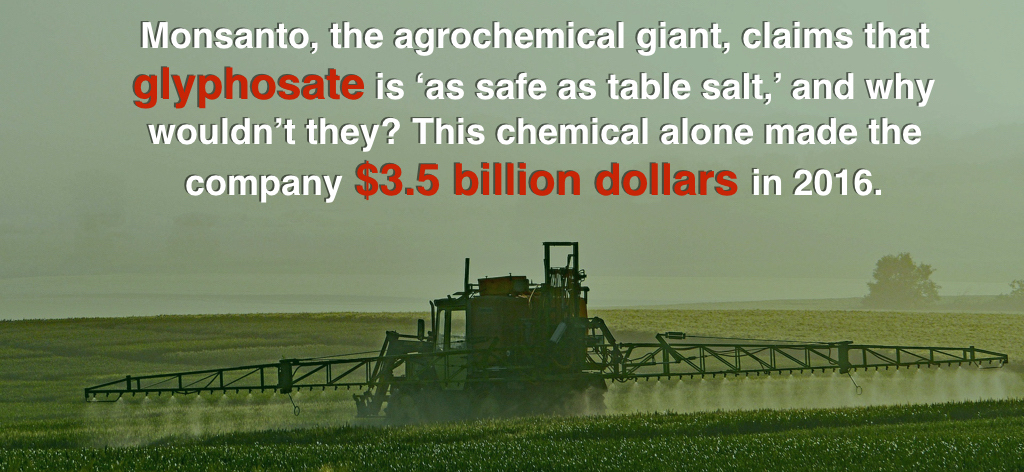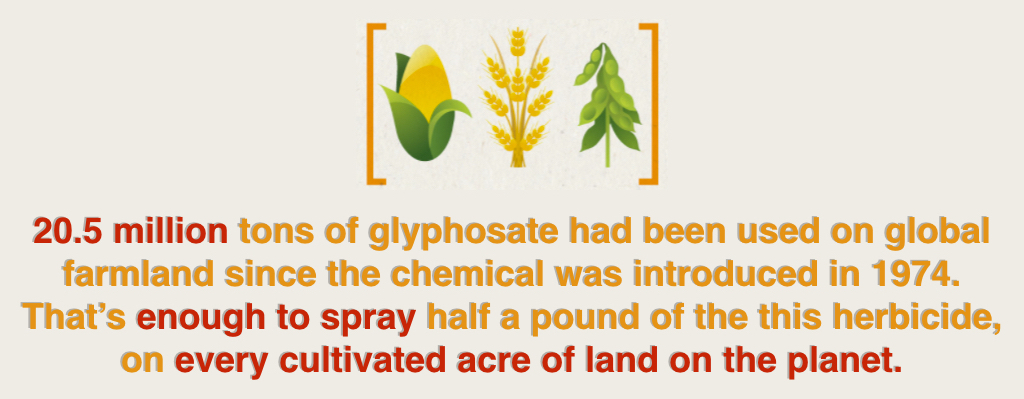In the 42 years since Monsanto first commercialized glyphosate, the active ingredient found in RoundUp, 9.4 million tons of the chemical have been sprayed on the world’s crops. While this has reportedly helped increase crop yields around the world, many experts have expressed major concerns over the associated health and environmental impacts associated with such pervasive use.
This poses a significant question – is glyphosate a cheap, safe and effective solution in agriculture, or is it a dangerous synthetic compound that damages global health and our food supply? One thing we know for sure is that we have yet to fully understand glyphosate’s impact. With the Environmental Protection Agency (EPA) and the European Union considering the relicensing of glyphosate in the coming months, finding the answer has never been more pertinent.
First, to examine the source: Monsanto, the agrochemical giant responsible for Agent Orange, PCBs and DDT, assures the world that glyphosate is ‘as safe as table salt,’ and why wouldn’t they? RoundUp alone made the company $3.5 billion in 2016, while the seeds and genomic sector of the business (including all seeds that are RoundUp-Ready) earned a total $5.8 billion in the same year. The vested interests are clear. With so much capital at stake it is no wonder that Monsanto employs their own scientists to produce peer-reviewed scientific research to negate any concerns raised by the wider scientific community. What many people do not know is that this industry-funded research that has directed policy for years, finding the product to be relatively safe, is often based on fraudulent data.
It’s important to note that this deceit is not new to the agrochemical industry. Within the first decade of the EPA’s existence, the agency discovered that nearly all “safety tests” supporting pesticide registrations were faked. Industrial Bio-Test Laboratories was caught falsifying 99% of long-term studies supporting 483 pesticide registrations. For 25 years, most, if not all, agrochemical and pharmaceutical companies paid IBT to produce the test data they needed to register their products. The United States Food and Drug Administration officials have referred to this as “the most massive scientific fraud ever committed in the United States and perhaps the world.” This initial revelation occurred in 1983 and subsequent audits of 82 other testing laboratories were found to have ‘significant deficiencies’ in there research methodologies, including 22 labs that destroyed all of their reports and supporting raw data.
Fast-forward to present day and Monsanto has been caught attempting to conceal evidence of its close and continued relationship with regulators such as the EPA. A series of emails have been released during a federal court case in San Francisco, brought to trial by people who claim to have developed non-Hodgkin’s lymphoma as a result of exposure to glyphosate. This correspondence reveals ongoing communications between Monsanto and several federal regulators. These emails suggest that Monsanto produced research that was later attributed to impartial academics, adding the name of the academic to these studies after the fact. Monsanto also indicated that a senior official at the EPA prevented a review of glyphosate to be conducted by the United States Department of Health and Human Services.
Over the past few weeks, the research published by the globally renowned cancer-research branch of the World Health Organization, labeling glyphosate as a ‘probable human carcinogen’, has been called into question. This may well be due to Monsanto lobbying government and sponsoring research to defend the chemical. There is substantial evidence around the world, accumulated over half a century, that synthetic agricultural pesticides and other toxic chemicals are not only poisoning personal health, but also damaging the environment.
While researchers around the world have yet to truly understand the impact of these chemicals, we at Primal Group are building a new agriculture system based around natural and sustainable solutions to crop care, with the natural neem tree at the forefront of these efforts.

